12.6 Meditative Realms and Seasons
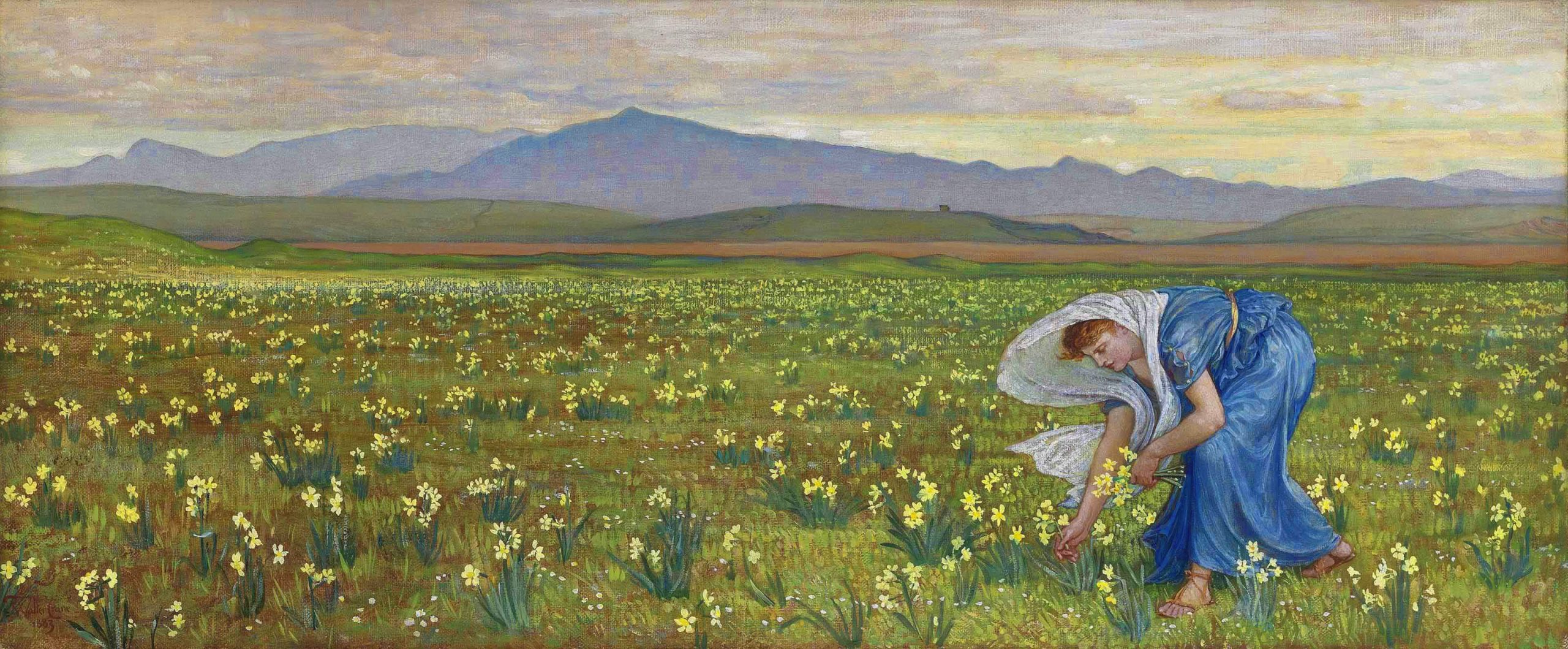
Courtesy: By Walter Crane – This file was derived from: Walter T. Crane – La Primavera (1883).jpg:, Public Domain, https://commons.wikimedia.org/w/index.php?curid=117774434
How have you been inspired and awed by a great work of art or a natural phenomenon of nature? What causes you to pause and reflect on the magnificent, the mysterious, and the uncanny? Is there a power that artists have to convey deeper level emotions and thoughts that rarely surface? How can this form of empathy and insight work to heal and transform pain and suffering? As you review these images and texts, think of great works of art (including art in nature) that have inspired you to think differently about yourself and life…
Sonnet VII. To Solitude by John Keats (1795-1821)
O Solitude! if I must with thee dwell,
Let it not be among the jumbled heap
Of murky buildings: climb with me the steep,—
Nature’s observatory—whence the dell,
In flowery slopes, its river’s crystal swell,
May seem a span; let me thy vigils keep
‘Amongst boughs pavilioned, where the deer’s swift leap
Startles the wild bee from the foxglove bell.
But though I’ll gladly trace these scenes with thee,
Yet the sweet converse of an innocent mind,
Whose words are images of thoughts refined,
Is my soul’s pleasure; and it sure must be
Almost the highest bliss of human-kind,
When to thy haunts two kindred spirits flee.
(Retrieved October 27, 2022. https://allpoetry.com/Sonnet-VII.-To-Solitude)
“A Light Exists in Spring” by Emily Dickinson
A Light exists in Spring
Not present on the Year
At any other period —
When March is scarcely here
A Color stands abroad
On Solitary Fields
That Science cannot overtake
But Human Nature feels.
It waits upon the Lawn,
It shows the furthest Tree
Upon the furthest Slope you know
It almost speaks to you.
Then as Horizons step
Or Noon’s report away
Without the Formula of sound
It passes and we stay —
A quality of loss
Affecting our Content
As Trade had suddenly encroached
Upon a Sacrament.
“Emily Dickinson (1830 – 1886) is considered a major American poet, though she was not accorded this honor until well after her death, when her younger sister discovered and began to share the enormous body of work that Emily left behind. A recluse who almost always wore white, Emily was born to a prominent Massachusetts family and spent the bulk of her life inside her home in Amherst. Only seven of her poems were published during her lifetime, and virtually none were published as originally written until the mid 1950s. (Emily’s odd punctuation, capitalization, and formatting did not meet with standard publishing “approval” for earlier editions.) There is a whimsical nature to many of her poems, although the subject of death was the most frequent recurring theme.”
Spring
“As every season seems best to us in its turn, so the coming in of spring is like the creation of Cosmos out of Chaos and the realization of the Golden Age….A single gentle rain makes the grass many shades greener. So, our prospects brighten on the influx of better thoughts. We should be blessed if we lived in the present always, and took advantage of every accident that befell us, like the grass which confesses the influence of the slightest dew that falls on it; and did not spend out time in atoning for the neglect of past opportunities, which we call doing our duty. We loiter in winter while it is already spring. In a pleasant spring morning, all men’s sins are forgiven.” – Henry David Thoreau, Walden, Arcturus Publishing, 2021, p. 253.
Seasons
“To the attentive eye, each movement of the year has its own beauty, a picture which was near seen before and which we shall never see again” (Ralph Waldo Emerson, 1836, Nature).
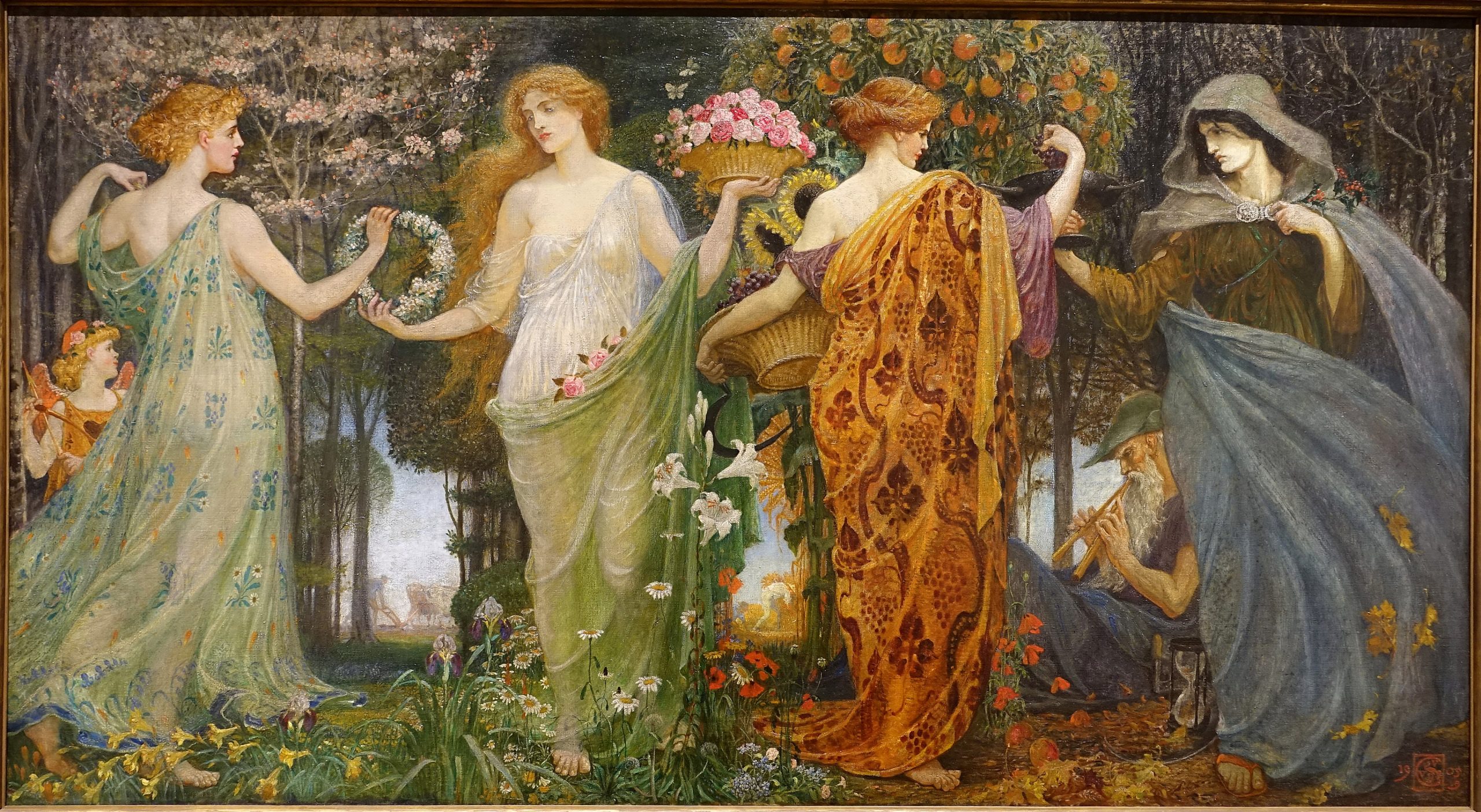
Andrew Marvel was one of the great metaphysical poets of the 17th century. Metaphysical poets used complex imagery, unusual comparisons and metaphors (conceits), and paradoxes to convey philosophical ideas. In “The Garden” the speaker contrasts the busy lives in the material world with the spiritual and emotional repose and retreat in the garden. The garden is also a state of mind and decision to be contemplative in a world with increasing pressures. What other landscapes –real and imagined— can you find to complement Marvell’s poem?
“The Garden “by Andrew Marvell
How vainly men themselves amaze,
To win the palm, the oak, or bays:
And their incessant labours see
Crown’d from some single herb, or tree,
Whose short and narrow verged shade
Does prudently their toils upbraid;
While all the flow’rs, and trees, do close,
To weave the garlands of repose.
Fair Quiet, have I found thee here,
And Innocence, thy sister dear!
Mistaken long, I sought you then
In busy companys of men.
Your sacred plants, if here below,
Only among the plants will grow.
Society is all but rude
To this delicious solitude.
No white, nor red was ever seen
So am’rous as this lovely green.
Fond lovers, cruel as their flame,
Cut in these trees their mistress’ name,
Little, alas! they know or heed,
How far these beautys her exceed!
Fair trees! where’er your barks I wound,
No name shall but your own be found.
When we have run our passion’s heat,
Love hither makes his best retreat.
The gods, who mortal beauty chase,
Still in a tree did end their race.
Apollo hunted Daphne so,
Only that she might laurel grow:
And Pan did after Syrinx speed,
Not as a nymph, but for a reed.
What wond’rous life is this I lead!
Ripe apples drop about my head.
The luscious clusters of the vine
Upon my mouth do crush their wine.
The nectarine, and curious peach,
Into my hands themselves do reach.
Stumbling on melons, as I pass,
Insnar’d with flow’rs, I fall on grass.
Mean while the mind, from pleasure less,
Withdraws into its happiness:
The mind, that ocean where each kind
Does streight its own resemblance find;
Yet it creates, transcending these,
Far other worlds, and other seas;
Annihilating all that’s made
To a green thought in a green shade….
(Retrieved Feb. 25, 2023 )
For the complete poem please open the Project Gutenberg Link below.
https://www.gutenberg.org/cache/epub/62187/pg62187-images.html
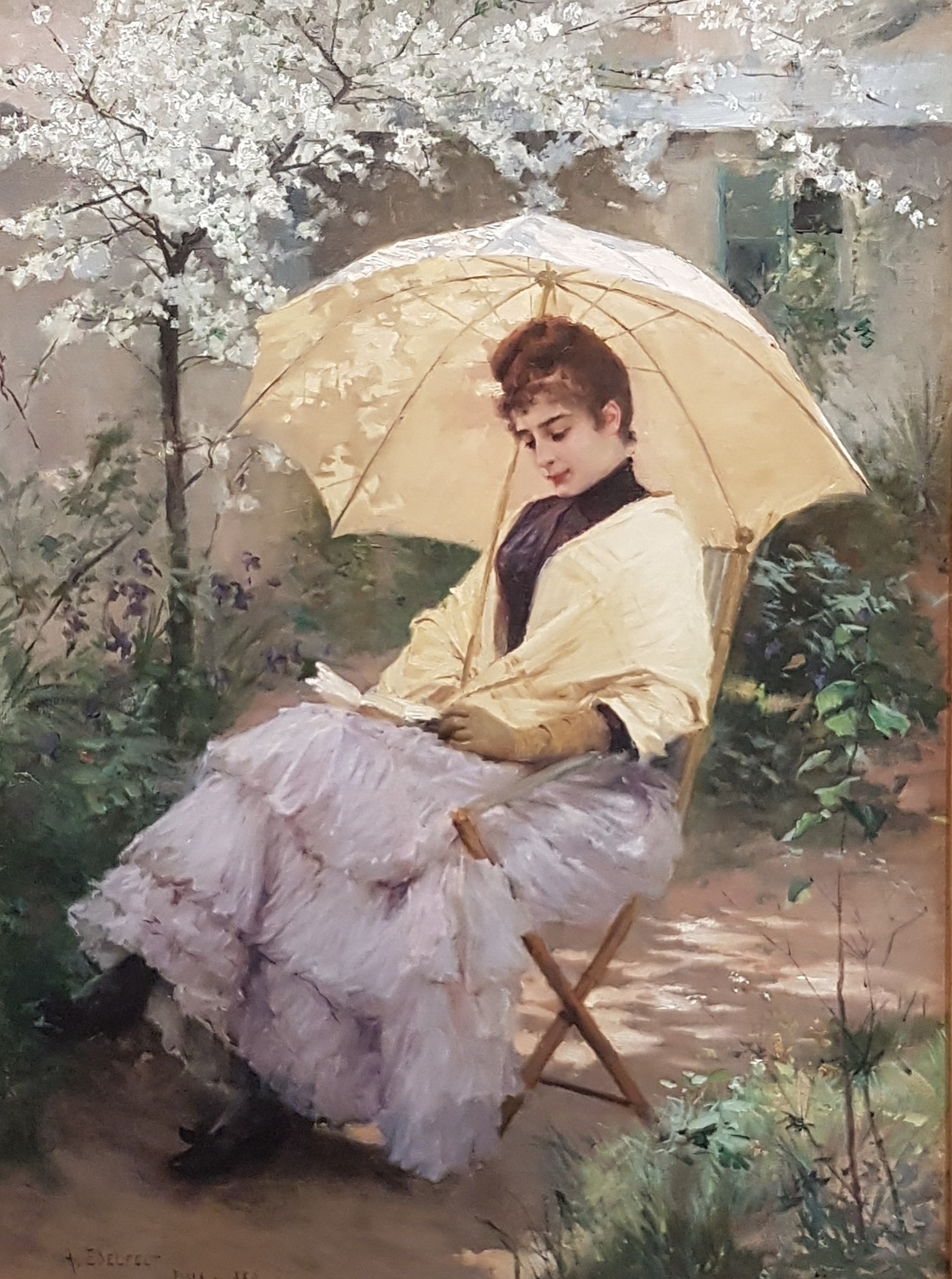
Courtesy: By Albert Edelfelt – https://www.facebook.com/KirsinKirjanurkka/photos/a.312252415507062/2506256879439927/, Public Domain, https://commons.wikimedia.org/w/index.php?curid=92670267
“Ode on Solitude” by Alexander Pope
Happy the man, whose wish and care
A few paternal acres bound,
Content to breathe his native air,
In his own ground.
Whose herds with milk, whose fields with bread,
Whose flocks supply him with attire,
Whose trees in summer yield him shade,
In winter fire.
Blest, who can unconcernedly find
Hours, days, and years slide soft away,
In health of body, peace of mind,
Quiet by day,
Sound sleep by night; study and ease,
Together mixed; sweet recreation;
And innocence, which most does please,
With meditation.
Thus let me live, unseen, unknown;
Thus unlamented let me die;
Steal from the world, and not a stone
Tell where I lie.
e)
To read more poems by Alexander Pope (compiled by David Wiger), please open the link below. Project Gutenberg ebook.
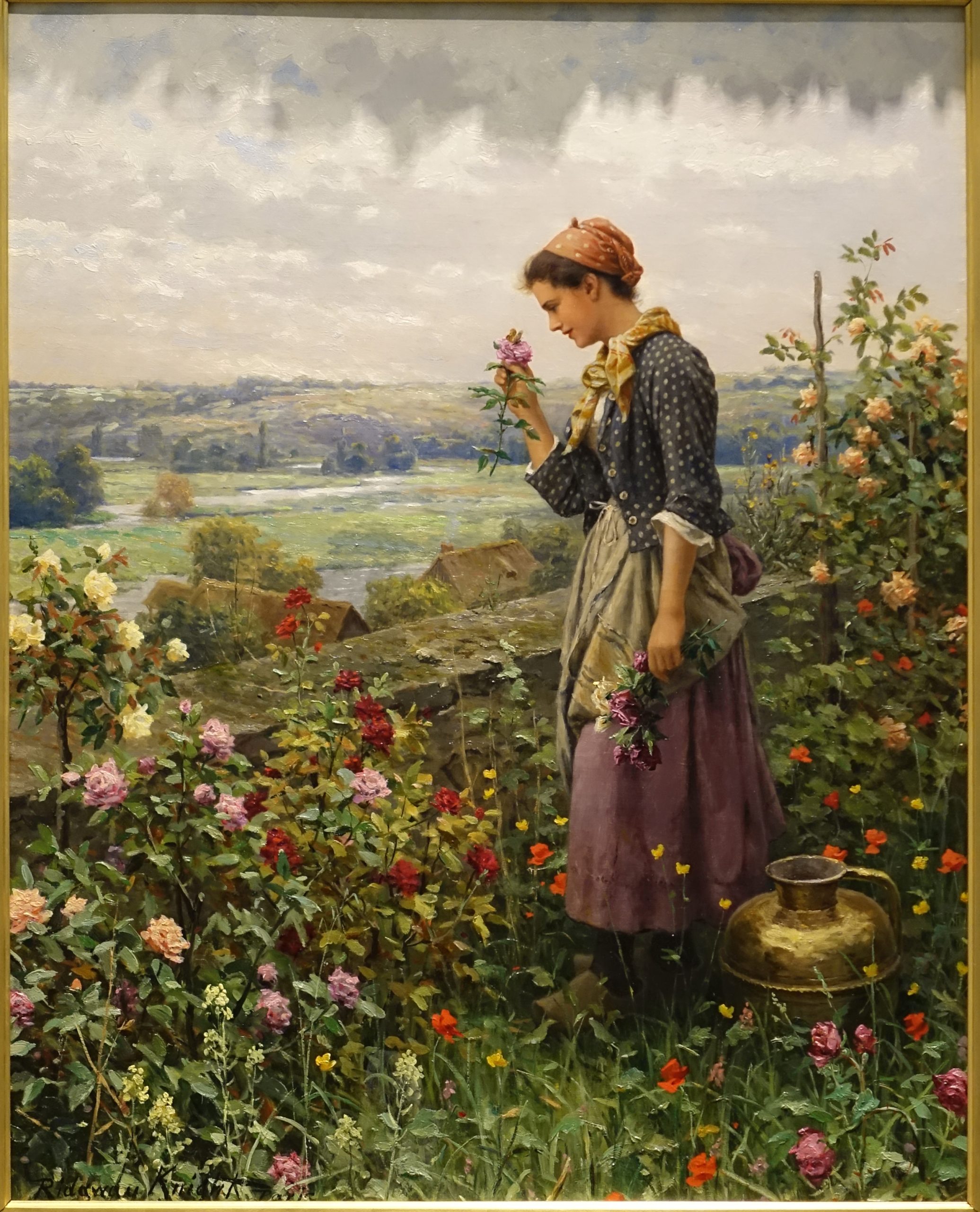
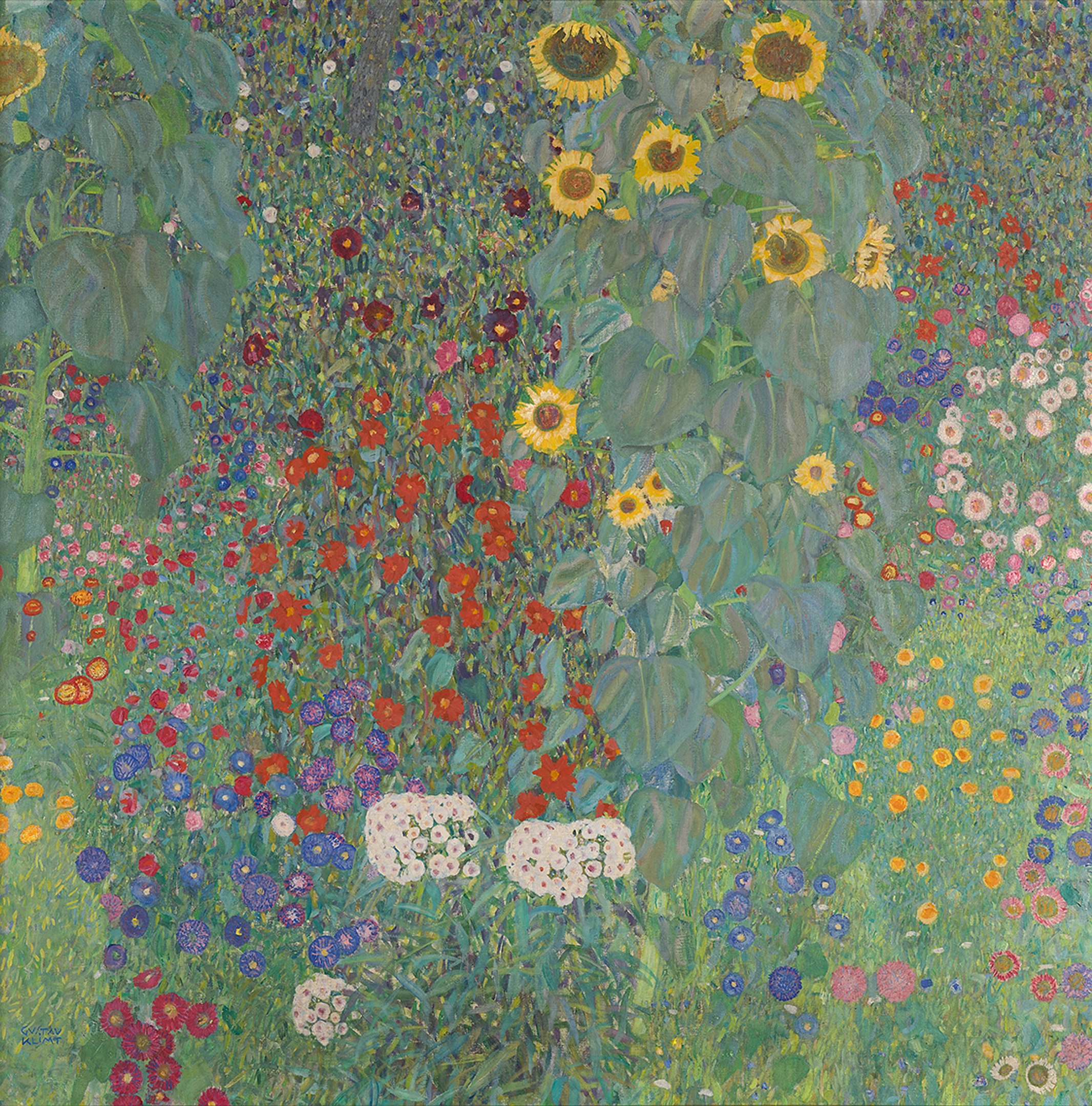
Courtesy: By Gustav Klimt – Österreichische Galerie Belvedere, Public Domain, https://commons.wikimedia.org/w/index.php?curid=72345116
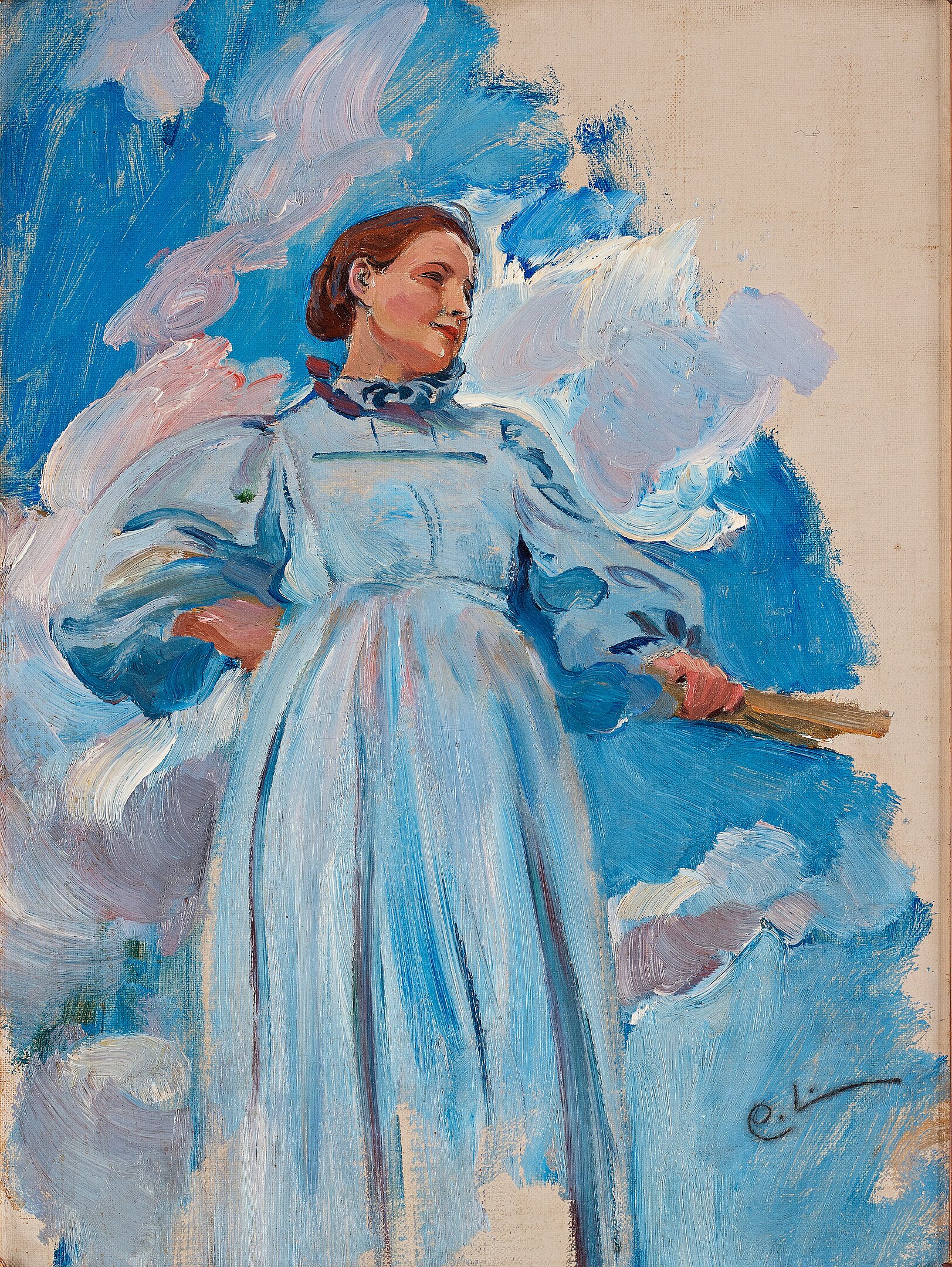
Courtesy: By Carl Larsson (1853–1919) – https://www.bukowskis.com/sv/auctions/617/341-carl-larsson-kvinnofigur-och-himmel, Public Domain, https://commons.wikimedia.org/w/index.php?curid=99648005
An April Morning by Bliss Carman (1861-1929)
ONCE more in misted April
The world is growing green.
Along the winding river
The plumey willows lean.
Beyond the sweeping meadows
The looming mountains rise,
Like battlements of dreamland
Against the brooding skies.
In every wooded valley
The buds are breaking through,
As though the heart of all things
No languor ever knew.
The golden-wings and bluebirds
Call to their heavenly choirs.
The pines are blued and drifted
With smoke of brushwood fires.
And in my sister’s garden
Where little breezes run,
The golden daffodillies
Are blowing in the sun.
(https://allpoetry.com/An-April-Morning)
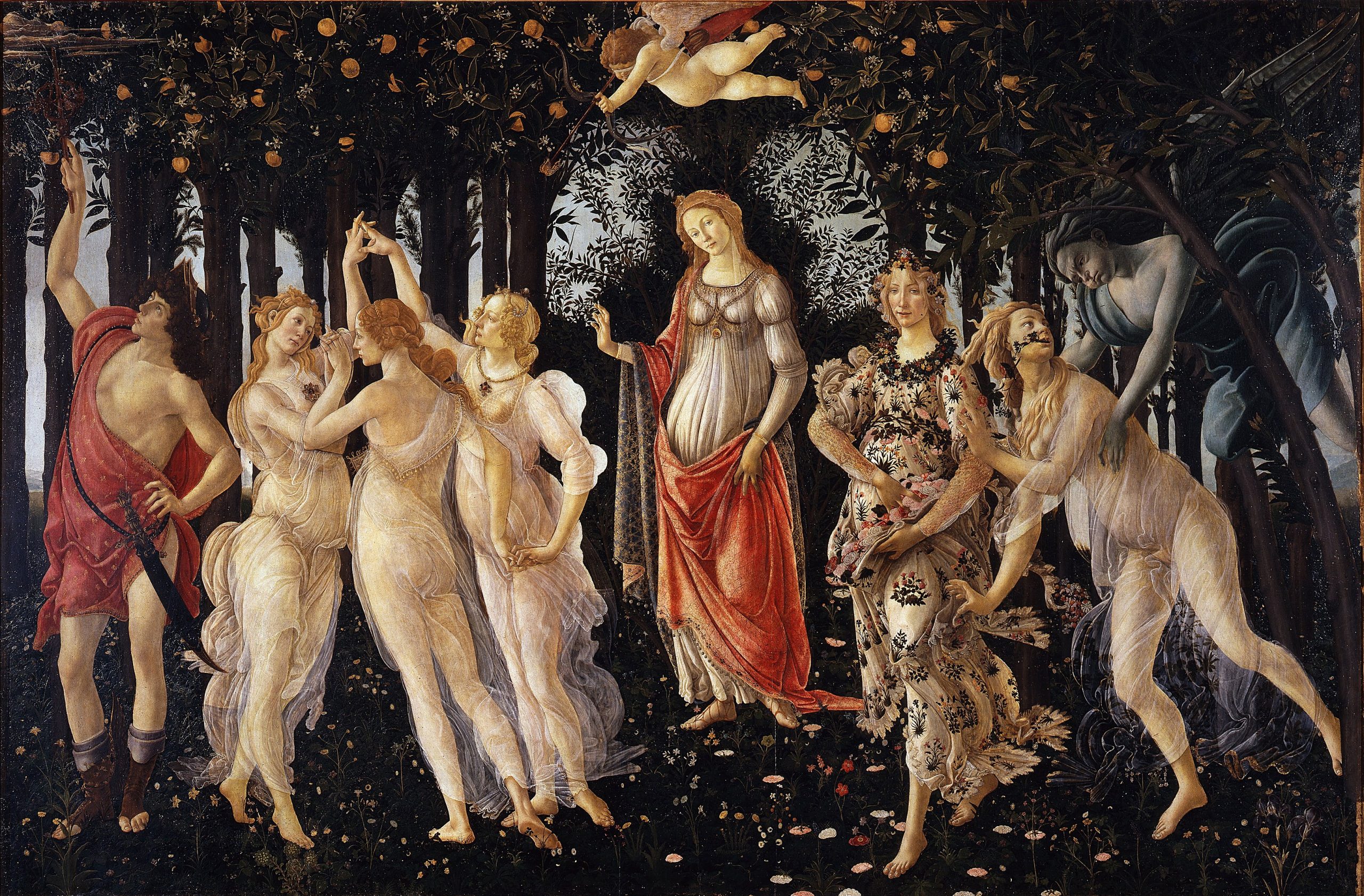
Courtesy: By Sandro Botticelli – http://www.googleartproject.com/collection/uffizi-gallery/artwork/la-primavera-spring-botticelli-filipepi/331460/, Public Domain, https://commons.wikimedia.org/w/index.php?curid=7963136
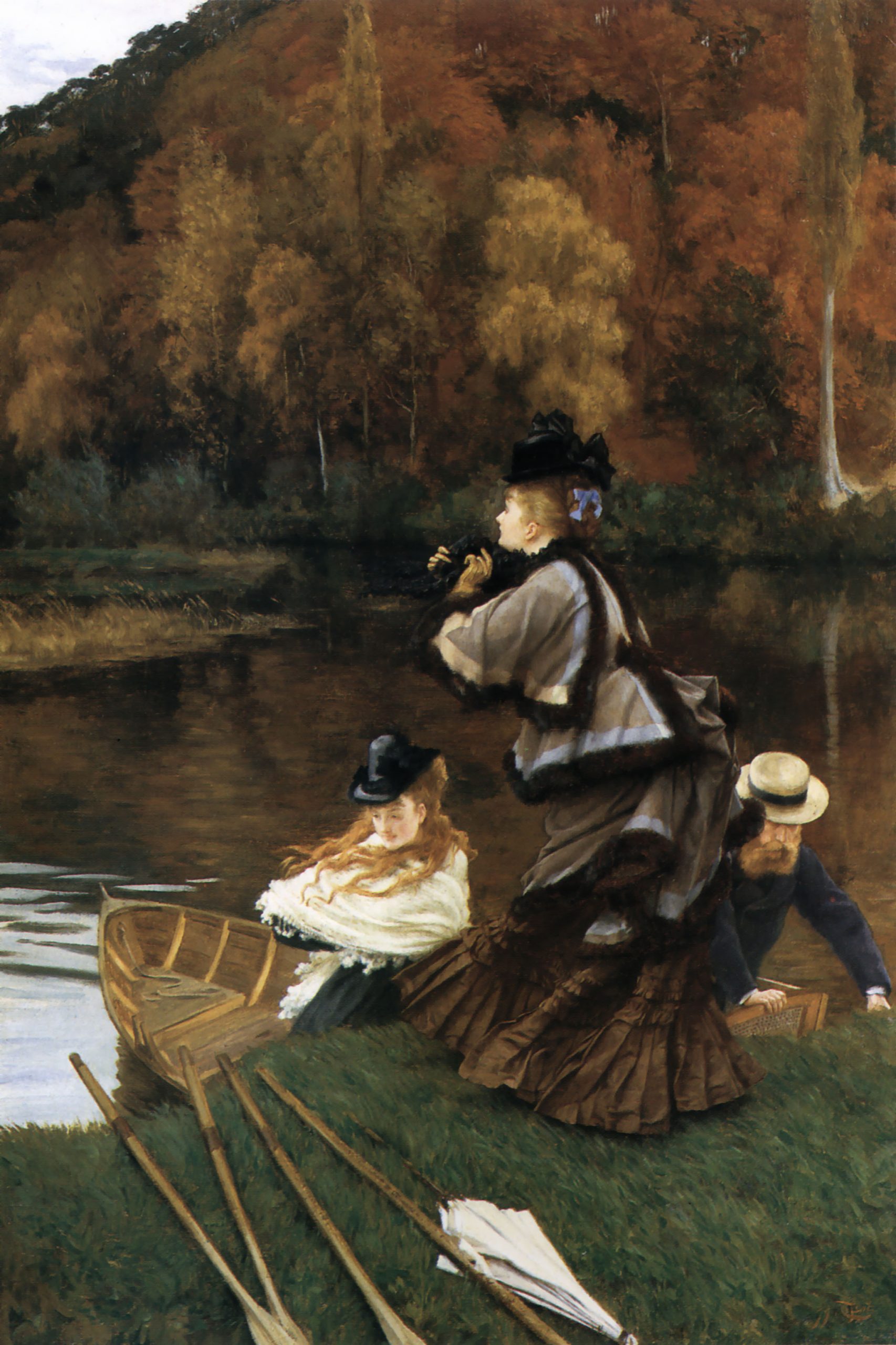
Courtesy: By James Tissot – [1], Public Domain, https://commons.wikimedia.org/w/index.php?curid=9100544
In October by Bliss Carman (1861-1929)
NOW come the rosy dogwoods,
The golden tulip-tree,
And the scarlet yellow maple,
To make a day for me.
The ash-trees on the ridges,
The alders in the swamp,
Put on their red and purple
To join the autumn pomp.
The woodbine hangs her crimson
Along the pasture wall,
And all the bannered sumacs
Have heard the frosty call.
Who then so dead to valor
As not to raise a cheer,
When all the woods are marching
In triumph of the year.
(Retrieved May 12, 2023 All Poetry Website: https://allpoetry.com/In-October)
Winter Scene
A Child’s Christmas in Wales by Dylan Thomas:
https://gutenberg.ca/ebooks/thomas-wales/thomas-wales-00-h.html
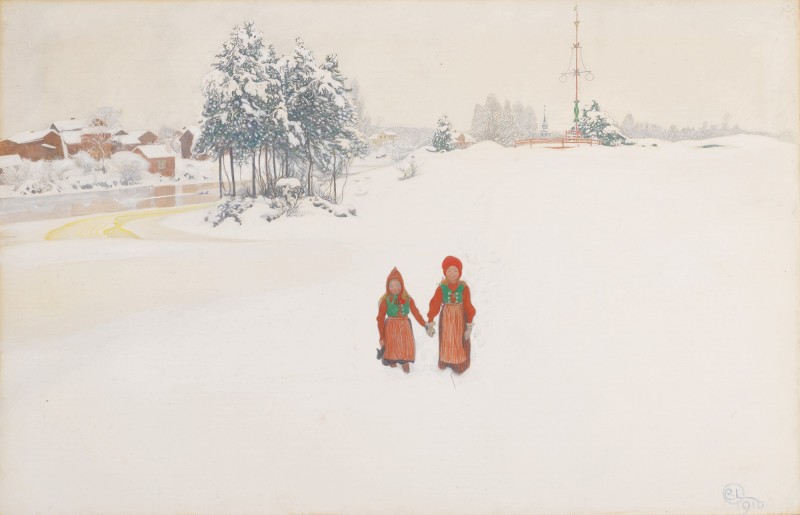
Courtesy: By Carl Larsson – https://www.sothebys.com/en/buy/auction/2020/european-british-art/in-the-snow, Public Domain, https://commons.wikimedia.org/w/index.php?curid=97255921
Winter Trees by William Carlos Williams (1883–1963)
All the complicated details
of the attiring and
the disattiring are completed!
A liquid moon
moves gently among
the long branches.
Thus having prepared their buds
against a sure winter
the wise trees
stand sleeping in the cold.
(Retrieved June 10, 2023. Poetry Foundation Website. https://www.poetryfoundation.org/poems/45504/winter-trees)
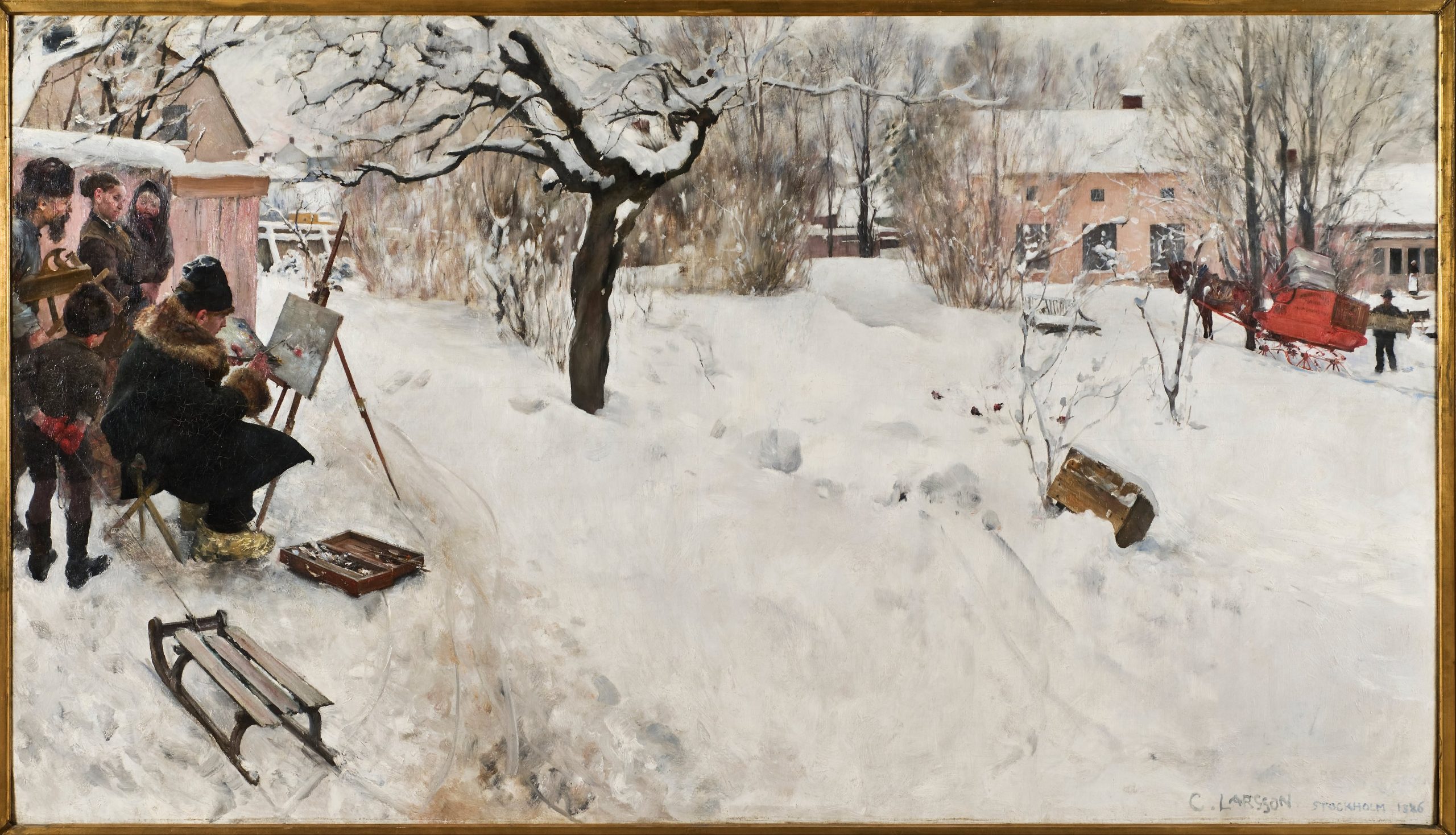
Courtesy: By Carl Larsson – bwEJZOVaCQUzfQ at Google Cultural Institute maximum zoom level, Public Domain, https://commons.wikimedia.org/w/index.php?curid=22264267
Stopping by the Woods on a Snowy Evening by Robert Frost (1874-1963)
Whose woods these are I think I know.
His house is in the village though;
He will not see me stopping here
To watch his woods fill up with snow.
My little horse must think it queer
To stop without a farmhouse near
Between the woods and frozen lake
The darkest evening of the year.
He gives his harness bells a shake
To ask if there is some mistake.
The only other sound’s the sweep
Of easy wind and downy flake.
The woods are lovely, dark and deep,
But I have promises to keep,
And miles to go before I sleep,
And miles to go before I sleep.
(Retrieved May 12, 2023 Poetry Foundation Website. https://www.poetryfoundation.org/poems/42891/stopping-by-woods-on-a-snowy-evening )
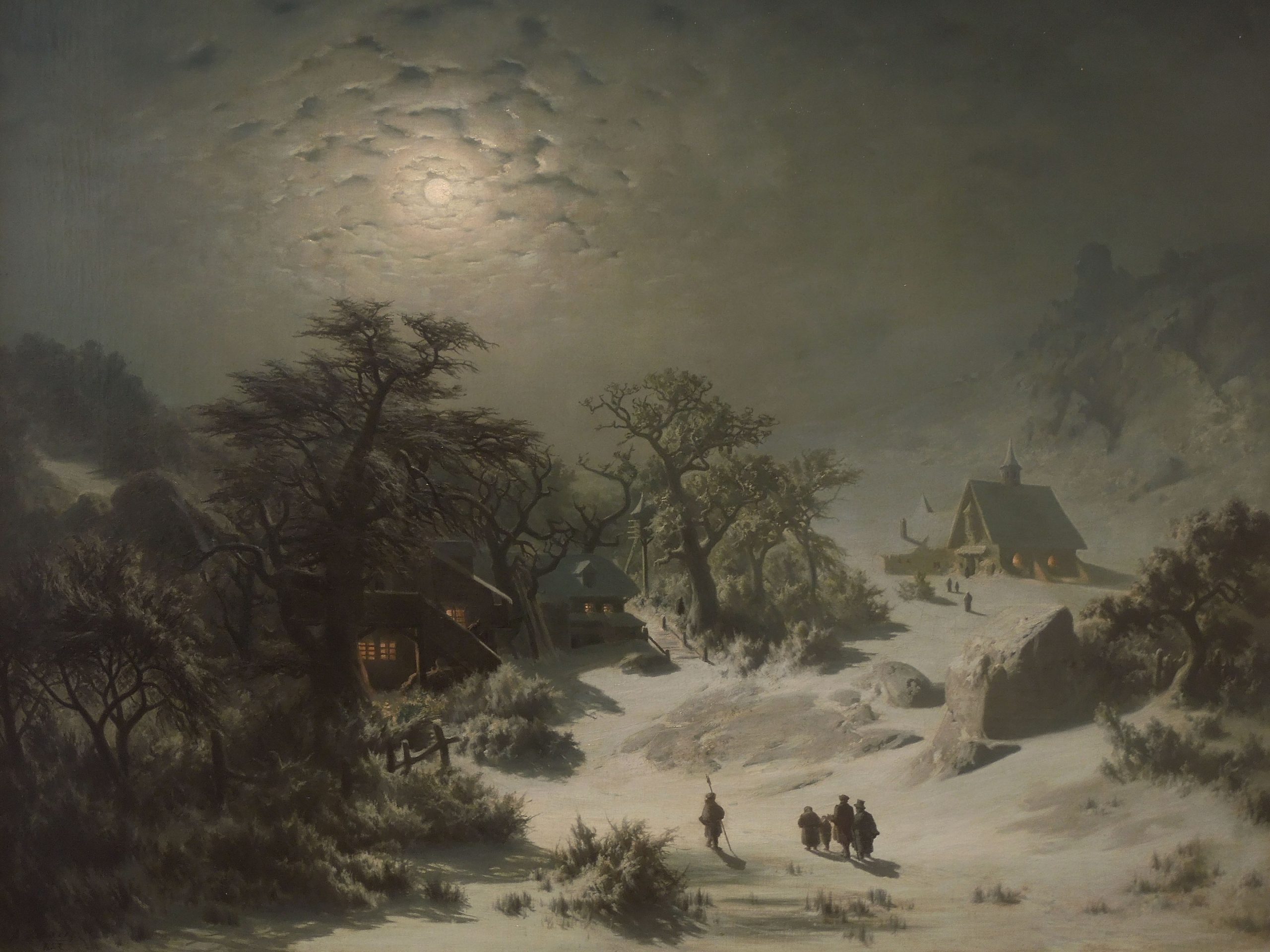
A Winter’s Tale by Dylan Thomas (1914-1953) (Excerpt)
It is a winter’s tale
That the snow blind twilight ferries over the lakes
And floating fields from the farm in the cup of the vales,
Gliding windless through the hand folded flakes,
The pale breath of cattle at the stealthy sail,
And the stars falling cold,
And the smell of hay in the snow, and the far owl
Warning among the folds, and the frozen hold
Flocked with the sheep white smoke of the farm house cowl
In the river wended vales where the tale was told…
(To read the entire poem please open the link below.
https://www.poemhunter.com/poem/a-winter-s-tale/)
Winter Streams by Bliss Carman (1861-1929)
Now the little rivers go
Muffled safely under snow,
And the winding meadow streams
Murmur in their wintry dreams,
While a tinkling music wells
Faintly from there icy bells,
Telling how their hearts are bold
Though the very sun be cold.
Ah, but wait until the rain
Comes a-sighing once again,
Sweeping softly from the Sound
Over ridge and meadow ground!
Then the little streams will hear
April calling far and near, —
Slip their snowy bands and run
Sparkling in the welcome sun.
(https://discoverpoetry.com/poems/bliss-carman/winter-streams/)

